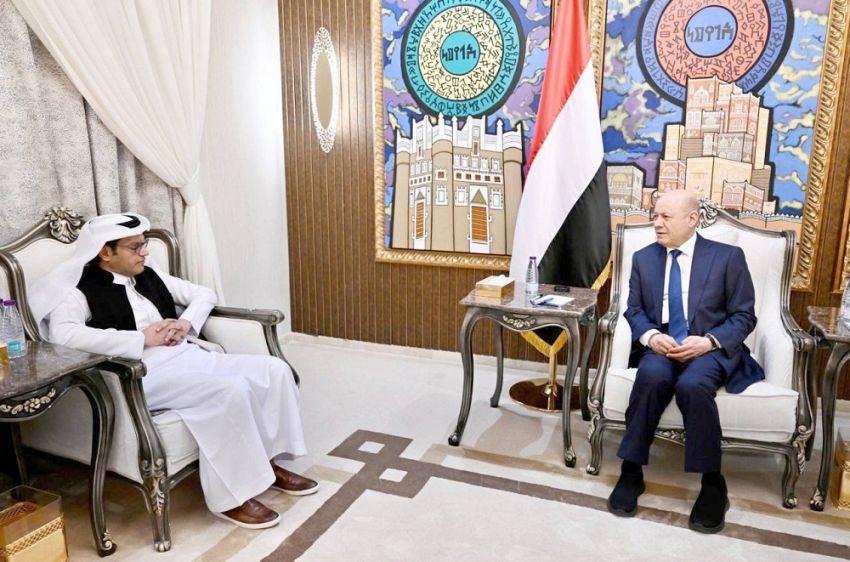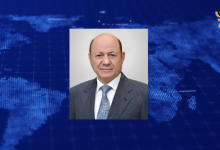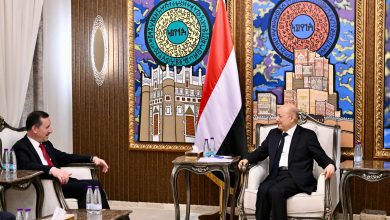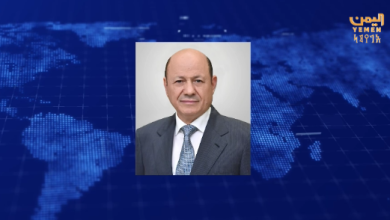The Presidential Leadership Council head states that relations with the Kingdom are exceptional, calling terrorism designation a peaceful deterrent against rogue militias.
President Alimi Advocates for International Terrorist Designation of Houthi Militias

In a recent interview with Saudi newspaper “Okaz,” President Dr. Rashad Mohammed Alimi, head of the Presidential Leadership Council, emphasized that the international community’s classification of Houthi militias as a terrorist organization represents the best peaceful option to deter their rogue actions. This comes after the group rejected all goodwill efforts aimed at alleviating the suffering of the Yemeni people.
Support for U.S. Decision
President Alimi praised the decision by former U.S. President Donald Trump to reclassify the Houthis as a foreign terrorist organization. He expressed hope that the militias would understand this “firm” message. Furthermore, he urged the Houthis to prioritize the interests of the Yemeni people over those of their backers and to pursue a comprehensive peace based on national, regional, and international references.
Alignment with Yemeni Government Actions
The President noted that the U.S. decision aligns with actions taken by the Yemeni government and its allies in the legitimacy-supporting coalition, who had previously classified the Houthis as a terrorist group. He highlighted the need for the Presidential Leadership Council and the government to focus on mitigating the humanitarian consequences of this classification, including relief efforts, commercial activities, and remittances from Yemenis abroad.
Misinterpretation of U.S. Actions
Alimi pointed out that when the U.S. administration lifted the terrorist designation, the Houthis misinterpreted this move as a sign of weakness, leading to an escalation of their attacks on oil facilities, civilian targets, and maritime shipping. These actions exacerbated the humanitarian crises in Yemen and the surrounding region.
Commitment to Peace Initiatives
The Presidential Leadership Council and the government have welcomed every peace initiative, including the truce agreed upon in April 2022, which they have upheld despite military violations by the Houthis. Alimi condemned the Houthis for attacking oil export ports in Hadhramaut and Shabwa, as well as international shipping routes, depriving the Yemeni people of essential revenue for salaries and basic services.
Government’s Response to International Concerns
In response to international calls for de-escalation, the Yemeni government froze its decisions to relocate bank headquarters from Houthi-controlled Sana’a to the temporary capital of Aden. This decision aimed to encourage the Houthis to engage in serious talks to address economic crises and revive peace efforts based on the roadmap proposed by Saudi Arabia. However, the Houthis responded with acts of aggression, including the hijacking of three Yemenia Airlines planes and attacks on the Safer oil facility in Marib.
Call for International Action
President Alimi stressed that the international community must adopt firm policies to deter the Houthis and push them toward a peaceful resolution based on national, regional, and international references, particularly UN Security Council Resolution 2216. He noted that the war instigated by the Houthis has resulted in over half a million Yemeni deaths and pushed more than 20 million people into hunger.
Need for International Pressure
Alimi asserted that without international pressure and sanctions to cut off the Houthis’ funding and arms supply, the group would not engage in any efforts to achieve a comprehensive and just peace. He acknowledged the international community’s concerns about the potential humanitarian impact of classifying the Houthis as a terrorist organization but insisted that alternative options must be explored to match the strength of such deterrence.
Strategic Commitment to Peace
The President reiterated that the option for peace remains a strategic priority for the Presidential Leadership Council and the government. He emphasized that peace cannot be achieved without a serious and responsible partner and that the Yemeni people will not accept any armed group that undermines the state’s authority and disregards national laws and international agreements.
Economic Recovery and Stability
Alimi outlined that the most viable path to peace in Yemen involves supporting the legitimate government, enhancing its capacity to build the economy, provide services, and protect its territory and maritime waters. He stressed that Yemen’s recovery and stability are not only national issues but also regional and global necessities, crucial for maintaining peace and security in the region.
Human Rights Violations by Houthis
The President condemned the severe human rights violations committed by Houthi militias in areas under their control, including widespread abductions of international staff. He warned that the Houthis would continue to exploit the international community, regardless of their political wings’ attempts to mislead public opinion by changing their terrorist tactics.
International Community’s Role
Alimi called on the international community to recognize the risks of not relocating organizations’ headquarters to Aden and pledged that the Yemeni government would ensure their safety and facilitate their humanitarian efforts across the country. He criticized the UN for inadvertently enabling the Houthis to use their personnel and assets as hostages for international leverage.
Achievements of the Presidential Leadership Council
Reflecting on the achievements of the Presidential Leadership Council and national forces opposing the Houthi project, Alimi noted that the coalition appears more capable of deterrence and has a stronger voice in regional and international arenas. He highlighted the formation of the council in April 2022 as a unifying effort to enhance the role of national components in both peace and war efforts.
Future Plans and Initiatives
The council has recently approved its strategy for the upcoming phase, focusing on political, economic, and military pathways. This progress reflects the commitment of its members to collective responsibility in addressing intertwined challenges. Alimi emphasized that the council’s military efforts include forming a joint operations authority to ensure unity in confronting any potential Houthi escalation.
Commitment to Justice and Security
The President affirmed that the council aims to enhance the rule of law and security as foundational elements of governance. He also mentioned efforts to address past grievances in southern provinces and restore the rights of employees dismissed after the 1994 war.
Addressing Public Protests
In response to recent protests in liberated provinces, Alimi expressed understanding of the underlying economic and financial challenges exacerbated by Houthi attacks on oil facilities. He assured that the council would work to address these demands and improve public resources and living conditions.
Support from Saudi Arabia
Alimi acknowledged the generous support from Saudi Arabia, which has been crucial for the Yemeni government to meet its basic commitments, including salary payments. He praised ongoing humanitarian and developmental interventions through the King Salman Relief Center and the Saudi Development and Reconstruction Program for Yemen.
Conclusion: A Unique Partnership
The President concluded by emphasizing the exceptional nature of Yemen’s relationship with Saudi Arabia, which encompasses security, social, and economic dimensions. He noted that this partnership has led to significant developmental projects in liberated provinces, including the opening of the Prince Mohammed bin Salman Hospital in Aden and various other initiatives aimed at enhancing the region’s stability and prosperity.
To follow the news in Arabic


